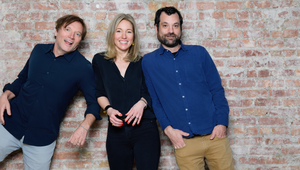
Vita Harris: Strategy is Inextricably Linked to Our Responsibility to Bring Positive Images to the World

It was early in Vita Harris’s career when she realised the responsibility she held as a strategist working in advertising. She was working on a campaign in the telecom space and the work represented a stereotype.
“It was at that moment that I understood how important, how inextricably linked strategy is to our responsibility to bring positive images into the world,” says Vita. Speaking up wasn’t easy – as a young African American woman making her way in the industry she knew she was risking her nascent career. “I was a baby, you know. I was just going into the mid level and I felt that I might potentially jeopardise myself by speaking up. But it was just one of those things - I couldn’t live with myself, I couldn’t look in the mirror if I didn’t speak up.”
It was a pivotal moment for Vita, who, years later, has been instrumental in shaping the strategic practice and, crucially, folding diversity, equity and inclusion into every brief across her current home, FCB. She has been with the network since 1996, and since 2011 has served as FCB Global’s chief strategy officer. She’s recently seen her roles and responsibilities elevated – she oversees FCB’s evolving strategic offering for clients across all disciplines, focusing on innovation and continuing the agency’s ongoing commitment to diversity, equity and inclusion (DE&I). And as far-reaching as her role has become, Vita has never forgotten those early lessons about the power and obligations people working in advertising hold.
What really helped her crystalise that understanding was a word of advice she received as a young researcher.
“I remember very early on someone said to me, it's your job to represent the consumer at the table. And I thought that was kind of profound. I have this responsibility. This was during the age when advertising really did drive so much in culture,” recalls Vita, who says this deceptively simple piece of insight helped her reconcile a tension that she had been toying with.
“I had been trying to make sense of the people who said that advertising was about manipulation. The negative noise that you hear about that,” she explains. “So, when someone said to me, ‘it’s your job to represent the audience, the people, the consumers. It’s your job to have that voice at the table’... that’s when everything clicked for me. I took that seriously and with great responsibility it helped me make decisions about what I needed to speak up on.
It helped me really figure out what to go to bat for.”
Since then, that understanding has grown into an idea that Vita calls ‘diverse mass’ and, together with colleagues at FCB (including strategic inclusion officer Marc Wilson who Vita says is instrumental in leading on this across the network) an intentional push for ‘upstream inclusion’ across the network. That is to say, inclusion and diversity not as a tagged-on addendum to a campaign but an integral part of its strategy.
“I’m responsible for the strategic underpinning of the work, and that’s the notion of upstream inclusion. For years and years, dealing with diversity, equity and inclusion in the work has happened on the back end, you do a dominant strategy and a dominant execution and then on the backend you say, well, does it work for these other groups? That’s sort of policing, in a way, in a more retrofitting way. And what we said is, we’re not going to participate in that any more. What we want to do is, from the beginning, start to understand where the opportunities are.”
One of the projects that really helped Vita develop her strategic approach to DE&I was not some highly niche, targeted brief that was all about one very culturally specific demographic. Quite the opposite, in fact. It was a brief that was, quite literally, aimed at everyone – the team was tasked with marketing the 2010 US census and encouraging every single adult American to fill it out. And that’s when the idea of diverse mass started to take shape.
“I’d never worked on a project where the consumer was everybody! Literally, everyone!” laughs Vita. “So that was my first exposure to thinking about strategy differently, instead of thinking of it as being what we call ‘a general market’, or just the dominant culture. Hence the birth of something that we refer to now as ‘diverse mass’. Yes, we work with a mass audience almost all the time, but is it dominant? Or is it something else? Is there other complexity to it that you have to understand? That’s when a lot of my thinking started to shape around this notion of diverse mass and what responsibility we have,” explains Vita, who says that a lot of this thinking is being evolved out of FCB’s Chicago office, but is applicable globally (though will, of course, manifest differently in different market contexts).
That embrace of the nuance within the mass speaks to something quite fundamental in Vita’s character. She has, she reveals, always been an incorrigible people watcher to the point that her friends would have to point out that she was staring. And she was also always full of questions – something that also stood out among her friends. Why might a person do the things they did or say the things they said? It’s that curiosity about the strange and ever-surprising behaviour of humans that brought her, in a roundabout way, to advertising. After studying marketing at undergraduate level and then focusing on it during her MBA, Vita almost went into banking. Then she entered the highly competitive IBM training programme. Realising she couldn’t imagine herself working in such an environment for the rest of her life, she stumbled into a part-time job for a market research company that worked with brands and agencies.
“I discovered that I was really curious about consumer behaviour. It connected the dots back to one of my favourite classes in undergrad, which was the consumer behaviour track,” reflects Vita.
Her father, an advertising and marketing professor, encouraged the move, but also warned his daughter that it was a volatile industry. Proving his wise words correct, Vita started out at Compton Advertising as a researcher… and the very next day it became Saatchi & Saatchi Compton.
Over the course of Vita’s career, the nature of strategy and planning has morphed. She joined before the British planning model had landed in the United States, when research and strategic planning were closely entwined. Vita notes that in some ways, planning has come full circle. “I have lived through that whole thing – and ironically now there’s an interesting return back to more data and proven metric-based planning,” she says.
And that growing importance of data also plays into Vita’s deeply held sense of responsibility – both to clients and to consumers.
On the consumer front, she can see that data is a crucial tool in teasing out the threads of nuance within the diverse mass. Vita recalls when she first met Tina Allan, FCB’s global partner and head of data science and connections who joined the network in 2021. “We were talking about diverse mass wherever you are in the world and she said, ‘part of our job is to unbias the data’. That was a moment of joy for me because it really did speak to what we want to see happen.”
But to the clients, the integration of data speaks to another kind of responsibility towards their businesses. “I think what’s happening is we’re becoming more accountable than ever before. Susan Credle talks a lot about being an economic multiplier. I think creativity just for creativity’s sake, in our industry, is not what we’re hoping to accomplish. I think a lot of the success we’re seeing as an agency is that we can connect creativity that produces economic multiplication. That’s what every client is looking for,” explains Vita.
“I’ve always believed that creativity should lead to some kind of results. I think what happens now is, with more and more data, we’re able to make better choices about what path we pursue for a client.”
Data isn’t the only thing that’s holding the network accountable. For the past five or six years, Vita and her team have been working to build a purpose-based framework that can spell out a company’s reason for being and give it a North Star to keep it focused. She calls this the Brand Bedrock – and of course it’s something that FCB has applied to itself.
“We launched a tool around what the purpose of a brand was beyond making a profit. It wasn’t about altruism or anything like that - it literally was: ‘why does this brand exist’. Obviously if we’re launching something like that, we have to do it on ourselves. We were actually able to define our Brand Bedrock as being a company which is around fueling creativity through diversity, data and technology,” says Vita.
And having crafted this bedrock (incidentally, Vita is, as well as being a keen people watcher is a keen crafter too), it’s now become a network-wide mission. “It informs everything. Not just what strategy and planning is accountable for, but every single person in our company, even if you work in finance, no matter where you sit, we hold everybody responsible for this.”
For strategists, these three lenses are fundamental. “I think that’s a big change for a strategist. We have to think about our audiences through the lens of these three critical things,” says Vita, who explains that these lenses stack and interact in surprising and challenging ways - for example thinking about DE&I through the lens of culture or thinking about culture through the lens of technology. “It's a challenge and quite honestly, I haven't mastered that. I think that's when I start to appreciate ‘never finished’ as an equity in our brand is that it gives me permission to say it's never going to be finished. I'll always be learning and I think it helps our planners start to think differently about what they need to know and what they're responsible for and where insights are going to come from. I always go back to what's our North Star – fueling creativity through these three things. And if I'm not delivering on those things, and if our planning planners aren't delivering in those spaces, we've got a lot of work to keep doing.”
It’s notable that throughout Vita’s tenure as chief strategy officer for Draftfcb and now FCB globally, the network has gone from strength to strength, carving out a reputation for award-winning work. When asked what’s driving that success, she notes it’s a big question with a big answer. The leadership team built up by recently-departed global CEO Carter Murray has been deliberately diverse and a particular mix of people. The leadership shown by Susan Credle, the network’s global CCO, as well as local level pioneers like FCB Ulka’s female CCO Swati Bhattacharya. And, though she won’t say it herself, Vita’s prescient, strategic approach to human diversity and inclusivity, her rigour when it comes to data and effectiveness – and, again, that career-long sense of responsibility – has no doubt rippled outwards across the network.
“All of those things coming together in the right moment has created this impact,” says Vita. “It’s really about being impactful with the creative that we’re making and being certain that we’re held accountable.”















